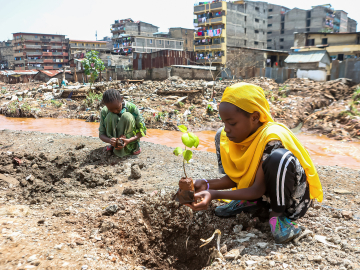Advice for Tedros: Laurie Garrett Q&A, Part II
GENEVA – Global health expert Laurie Garrett has some surprising advice for WHO’s new Director-General Tedros Adhanom Ghebreyesus: Don’t travel too much.
The senior fellow for global health with the Council on Foreign Relations says she’s given that advice to previous DGs who have ignored her and then regretted doing so. In addition to avoiding permanent jet lag, DGs can also prevent turf battles and other problems amongst WHO departments by limiting travel.
In the second part of GHN’s Q&A with her, Garrett considers Tedros’s challenges with the paltry WHO budget and how to give the people a voice at the World Health Assembly.
Do you think that Tedros will have what it takes to drive through an increase in the assessments and reducing the earmarks for the WHO budget? Would other countries be open to significantly increasing the assessments?*
They never have been. And as you know, last year … Margaret Chan convened a special meeting, here in Geneva. She tried to get all the nations to come. I think about, if I recall, it was about 90 came. So, it was far from the full complement. It wasn’t like a mini-World Health Assembly. And Germany was her main supporter in the venture, and they tried to get the countries to commit to raising their assessments. And all of Africa said, as a bloc, “We will. We are for it. We may be the poorest in the world, but we are in favor.” It was shocking, to listen to nation after nation get up and give their reasons why they would never support an increase in their dues. And the reasons were, all the petrochemical states said oil prices are down. Nigeria was the only African country that expressed some consternation. “We will, with difficulty.”
Mexico [said], “Oh, oil prices are down. Tourism is down. We’re just too poor.” When you look, and see how much they were actually paying, you know, this is like, one guy’s mortgage. And you’re saying you’re too poor, as a nation of hundreds of millions of people, to pay 2 guys’ mortgages? Well, then, you obviously can’t pay for your schools for kids, and blah, blah, blah, blah, blah.
And India, saying they can’t. Oh, they pled giant poverty. And you know, they are paying nothing. And they never pay voluntary. So, it was a 100% failure. Even the United States, Obama, said—yeah, so it was 2016. It was at the end of 2016. Even the Obama folks said, “We want to see more reform, before we’re going to throw the money in.”
* Ed. Note: After the interview, the World Health Assembly approved a 3% increase in assessments.
What would be your advice to Tedros be, both on the budget, and then on other issues, in terms of getting WHO moving forward in a more positive direction, which everybody seems to want?
He actually has a really smart team around him. And I’m sure he’s getting excellent strategic advice already. The one piece of advice I’ve given to every single incoming DG, and they all ignore it, and then years later, they all tell me, “Oh, my God, you were so right.” Figure out how to minimize your travel. Because this place [WHO headquarters] is a shark’s nest. And if you’re not here to run things, in Geneva, the mice are stealing the cheese. And huge program battles break out between departments, and [they] start sabotaging each other, and I mean, you’re talking about entrenched bureaucracies that exist to defend their turf.
Right, right.
And when the boss isn’t around, they go to town. And then you’ll see whole programs in poor countries all over the world suddenly disappear. And it’s a big mystery. Why did that happen? And it literally is because the DG wasn’t there to tell them no. And the other problem with the DG traveling so much is that they’re in a permanent state of jet lag, and they start losing their own capacity to judge. And so, they start sounding like motormouths. You know, “Well, you know, all, everybody needs UHC. Blah blah blah blah blah.” And they go on autopilot, because they literally don’t know what time zone they’re in.
At one point, I was at a meeting in Seattle, and Margaret Chan was there. And I took one look at her, and I mean, I know jet lag when I see it. (Laughs.) I’ve been there and done that. And I saw that she was starting to fade and was literally going to keel over. And I just went right up to her and said, “Hey, Margaret, sit down with me a minute.” And I got her seated and I said, “I know that you are struggling. It’s that feeling like you’re 2 years old, and the adults are awake. And you’re trying to stay awake for the fun, but your little 2-year-old body just so wants to go to sleep.” And she looked at me kind of a little miffed, like that it had been noticed. And I said, “You’re traveling too much. You’ve got to cut it back. It’s going to—you know, you’re healthy. You’ll survive it. But your decision-making capacities, your ability to follow what people are saying to you diminishes.”
That’s probably surprising advice to a lot of the new DGs, because their first instinct, I’m sure, is to be out there and to be visible, and to be global.
Well, especially now, because they’ve all been campaigning all over the world. So, I mean, Tedros is already there.
Any last thoughts on how you see the next couple of years unfolding for Tedros?
In my experience, every new DG faces an onslaught immediately of interest groups that are more chronic disease, or more infectious disease, more health systems or more vertical programs. More—you know, go down the list. And a lot of them come from institutions like yours, who will claim massive amounts of data and experience to demonstrate that this kind of program is what he should be doing. And this is what WHO should emphasize. And in Margaret’s case, I think, for the first year or so, she really got jerked around. You know, a lot of persuasive arguments, a lot of constituencies.
The voice that everybody has the hardest time breaking through, and really hearing is the average health consumer. The citizen on the street. The civil society groups. And this is especially true now, because there is a lot of resentment inside the institution about the role that—the very prominent role that MSF, International Medical Corps … you know, that groups like this were the ones shouting, “WHO’s not doing their job, and here is what we see on the ground.” And in the Constitution, the way this whole institution was set up, in 1948, it’s about the states, and it’s about the ministers of health. And if you come from a country like Ethiopia, where dissident groups and civil society face repression, you may be accustomed, as a minister of health, of plowing ahead without listening to them. And they don’t have a voice in the World Health Assembly.
It’s hard to even get credentials as an observer, if you’re from any of those organizations. And that goes across the board, for every kind of meeting and activity WHO does. Civil society is there by invitation. They participate at the discretion of. And this means that, first of all, there’s prioritizing of which are the real civil society voices and which aren’t. Secondly, it’s very difficult for a small group in a poor country, to have even an airplane ticket to Geneva, and the ability to afford to stay at one of these ridiculous hotels. And so, you pick any country in the world, and we just don’t’ have it set up in a way that allows those people to have a voice.
Read Part I of Brian Simpson's interview with Laurie Garrett here.
Want more info on #WHA70? See all of GHN’s #WHA70 coverage here, and follow us on Twitter and Facebook.
Join the thousands of subscribers who rely on Global Health NOW summaries and exclusive articles for the latest public health news. Sign up for our free weekday enewsletter, and please share the link with friends and colleagues: Subscribe to GHN
New WHO DG-elect Tedros Adhanom Ghebreyesus greets Laurie Garrett on May 24, 2017. Image: Brian W. Simpson





